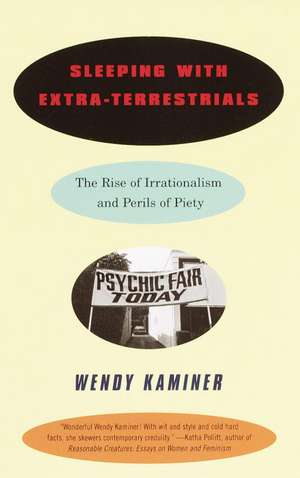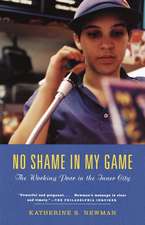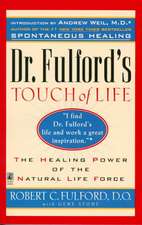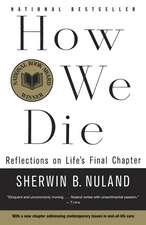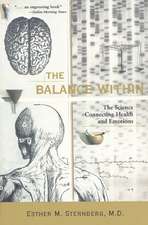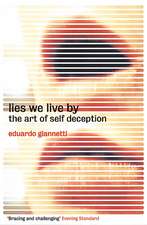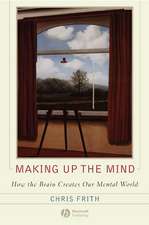Sleeping with Extra-Terrestrials: The Rise of Irrationalism and Perils of Piety
Autor Wendy Kamineren Limba Engleză Paperback – 30 sep 2000
Probing the amusing and ominous implications of rampant credulity in our age, Kaminer raises important questions, and provides a thoughtful and eloquent perspective on the perils of present-day irrationalism.
Preț: 93.44 lei
Nou
Puncte Express: 140
Preț estimativ în valută:
17.88€ • 18.72$ • 14.88£
17.88€ • 18.72$ • 14.88£
Carte disponibilă
Livrare economică 10-24 martie
Preluare comenzi: 021 569.72.76
Specificații
ISBN-13: 9780679758860
ISBN-10: 0679758860
Pagini: 288
Dimensiuni: 142 x 217 x 18 mm
Greutate: 0.39 kg
Ediția:Vintage Books.
Editura: Vintage
ISBN-10: 0679758860
Pagini: 288
Dimensiuni: 142 x 217 x 18 mm
Greutate: 0.39 kg
Ediția:Vintage Books.
Editura: Vintage
Notă biografică
Wendy Kaminer lives in Massachusetts.
Extras
Before I begin my critique of irrationalism, I have a confession to make: I go to a homeopath. Homeopathy may have about as much scientific credibility as reports of alien abductions and ESP; but I suspend disbelief and weather my embarrassment, because, somehow, homeopathy has helped me. When I first met with my homeopath she asked me to describe my greatest fears. Aside from being old and sick and infirm, I said, my greatest fear was that someone would find out I'd consulted a homeopath.
I mention this partly in the spirit of disclosure, partly to illustrate the power of any belief system that can make people feel better, and partly to explore our concept of irrationalism. When I go to my homeopath maybe I'm following one of the precepts of the recovery movement that I've always derided: I'm thinking with my heart and not my head. Or maybe I'm acting rationally after all. Believing in homeopathy may be irrational, but not using homeopathy if it works would be even more irrational. I care only if medicine works, not why. (I have the vaguest understanding of antibiotics.)
So I don't listen to scientists eager to tell me why homeopathic remedies can't possibly work, because they violate the laws of chemistry. Assuming that the scientists are right, and the remedies I've taken are mere placebos, why would I want to start doubting--and diminishing--their effectiveness? Why not be susceptible to placebos?
It would be irrational, however, for anyone to take my account of homeopathy's effectiveness at face value. Maybe I'm lying, or maybe I'm imagining that homeopathy has helped me. Maybe I'm confusing correlation with causation: perhaps I began feeling better coincidentally, for some unknown reason, at about the time I turned to homeopathy. If you're intrigued by my report, you should ask me to substantiate it, with some objective evidence. You should try to duplicate my experience.
The contrary willingness to accept untested personal testimony as public truth is at the heart of the irrationalism that confronts us today. Ours is an evangelical culture. So many people convinced that they've been saved by Jesus, abused by Satanists, cured by homeopathy or the laying on of hands, abducted by aliens, or protected by angels seek public acknowledgment that their convictions are true. Imbued with messianic fervor, or simply seeking "validation," they are not content to hoard the truth; they are compelled to share it and convert the unenlightened, relying on the force of their own intense emotions. Generally, the only proof offered for a fantastic belief is the passion it inspires in believers.
It is usually futile to ask for more. Once, I found myself engaged in a "debate" with a caller on a radio show who claimed that she and her family had been abducted and molested by aliens. I suggested that it was, perhaps, unrealistic of her to expect strangers to believe her story merely on the basis of her testimony. So she offered as evidence of her encounters "bodily markings," "bodily memories," and (in a stab at empiricism) "metallurgically flattened shrubbery" outside her house. I told her I was sorry for her trouble. Sometimes I think I'm sleeping with an extra-terrestrial too.
While only a minority of listeners may have found this story of an alien encounter credible, many would probably have believed a more familiar supernatural tale--the report of a visit from a guardian angel or a conversation with Jesus. In presuming that her feelings constituted evidence of historic fact, the caller had religion on her side, in addition to both high and low culture, which also promote belief in revealed truths. Popular psychologies assume the authenticity of subjective experience. Academic fashions locate truth in individual narratives, and falsehood in the quest for objectivity.
The celebration of subjectivity discourages demands for corroboration. Let someone testify with great vehemence to an after-death experience, a foray into past lives, or an abusive sexual encounter in childhood, only recently recalled, and courtesy compels us to listen deferentially. A lingering cult of victimhood lends credibility to tales of abuse, and the etiquette of a confessional society deters cross-examination. Equally vehement expressions of doubt or disbelief may even be considered abusive. The mores of personal development are naturally relativistic: Everyone has his or her reality. A fact is simply what is true for you.
Subjective perceptions are touchstones as well for religious traditions that celebrate direct, individual relationships with God, from mysticism to methodism--although religion posits universal truths, not disparate individual realities. The therapeutic culture borrows from religion's focus on sensation when it conflates feelings and facts. The truth lies in what you feel, not in what you know "in your head," much less in what you can prove, personal development experts say. In this culture, feelings of abuse become evidence of abuse, as if rape or sexual harassment were ineffable realities, like the mystic's sense of oneness with God.
Like fiction writers whose imaginings aim to reveal emotional truths, recovery movement gurus, experts on angels, and other aficionados of New Age, as well as adherents of mainstream religions, traffic in "feeling realities." They exhort us ultimately to rely on our hearts, not our heads, to heed the voice of our own experience, as well as the alleged experiences of others who testify before us, to ignore the naysaying of science or reason--except that, unlike fiction writers, the experts on God, spirituality, and personal development claim to be dispensing actual facts--about incest, reincarnation, or celestial civilizations, the utopian future of humankind, the coming of the Messiah, or the divinity of Jesus Christ.
There is some irony in this relationship between popular therapy, established religion, and New Age spiritualism. (I consider the latter a form of religion.) Popular therapy generally focuses on individual health or fulfillment and promotes belief in relative, individual realities, assuming that diametrically opposed perceptions of the same people or events may be equally true: generally, it resists choosing between conflicting accounts of siblings who experience and describe their families differently (although believers in the ubiquity of child abuse will choose the claims of accusers over the doubts and denials of other family members). Organized religion and diffuse spirituality movements represent the contrary quest for absolutes: individual experience is exalted when it leads us to a presumptively universal truth--like the existence of an omniscient, transcendent being, or inevitability of reincarnation.
In other words, to the extent that therapy focuses on self-actualization, it tends to imbue the subjective with normative value: it uncovers the self. For religion, the value of subjective perception tends to be primarily instrumental: it leads us to God.
Yet the relativism of therapy has become the handmaiden of religious or spiritual absolutism. The therapeutic culture teaches us to believe or at least take seriously impassioned reports of personal experiences, from the mundane to the miraculous. And, thanks partly to the recovery movement, the practice of therapy itself has become spiritualized, focusing on "care of the soul" as well as the psyche.
The marriage of psychology and religion is hardly new. William James presided over it, quite brilliantly, one hundred years ago. The coupling was inevitable. Images of God and various "spiritual entities" are inextricably bound with our own self-images, and as James observed, religions begin with "the feelings, acts, and experiences of individual men in their solitude . . ." This does not reduce the religious experience to mere psychological or physiological reflex. James greatly respected individual intimidations of the Divine, and resisted attributing them to "organic dispositions." But he consistently emphasized the links between temperament, belief, and ideology: "[T]he whole man within us is at work when we form our philosophical opinions. Intellect, will, taste, and passion co-operate . . ."
The personal development tradition has always demonstrated the relationship between attitude and doctrine. Positive thinking, rooted in the nineteenth-century mind-cure movement (one of James's subjects), has always included magical thinking and has always qualified as a "religion of healthy-mindedness." It's not surprising that America's premier, mass-market pop psychologist--Norman Vincent Peale--was a positive thinker and a clergyman.
As an amateur therapist, Peale was anomalous only in the degree of his success. Less entreprenurial members of the clergy have long engaged in counseling members of their congregations. They have had to balance relativism and compassion for troubled individuals with the moral tenets of their faiths. Now, the relationship between religion and therapy is in reverse: therapists are exhorted to join the clergy in the quest for absolutes. Popular nostrums warn us not to separate the search for self from the search for God, even as neurology provides physiological answers to existential questions. (The spiritualization of pop therapies was not deterred by an increased reliance on Prozac and other psychotropic drugs.) It's not surprising that while some practitioners respond by paying more attention to the patient's spiritual yearning, others presume to satisfy it. Therapists who claim psychic powers or help their patients recover memories of past lives, as well as memories of abuse in this life, dispense supposedly universal truths--about life after death, ESP, and other metaphysical questions.
But whether it offers to help us find a Higher Power or simply forge a better understanding of our parents, therapy has long been a quasi-religious endeavor, as well as a quasi-scientific one. The elevation of individual testimony or sensation over logic and verifiable fact--in other words, faith--has always linked popular psychology to spirituality and religion. Western religious faith--or supernaturalism--is the primary subject of this book. I was graced with relatively little of it and have sometimes regretted my resistance to believing in a supreme being and various visions of immortality. I'm not oblivious to the comfort that supernaturalism may provide or unimpressed by the powerful human impulse to believe; nor am I utterly secure in my disbelief. Skepticism is attitude, not dogma.
Writing about spirituality and religion, I've found it necessary to clarify my own beliefs or lack of them, as well as my intentions (which is why this introduction is itself a bit confessional). Not quite brave enough for atheism, or absolutely sure of my judgment, I fall back on agnosticism--either a cowardly or judicious alternative to religious belief. I'm not an evangelist and don't aim to dissuade anyone from believing in transcendent realities and supernatural occurrences. I express opinions mainly because I find them so hard to suppress.
For my lack of missionary zeal, I have been castigated by a few militant atheists, who are irritated by my disinclination to try persuading people to abandon their faith that God exists (while some religious people regard me as a militant atheist intent on promoting worship of unspecified "secular idols"). But even if I harbored a desire to impose my faithlessness in God on others, why embark on such a futile exercise? It would require megalomaniacal belief in my own powers of persuasion to anticipate even modest success. The human need for divinities seems fundamental.
I don't mean to denigrate this need and the impulse to believe, which seems inseparable from the impulse to create. Creative insights can come to the most atheistic artists and scientists with the force of revelation. Romantic poets sought truth in imagination, and so, in a way, did the pragmatic, secularist John Dewey. He regarded the formulation of social ideals as a collaborative, creative process, involving the interaction of imagination with experience. From this perspective, if you don't consider the Bible a history of the sacred, you may read it for what it reveals about the human imagination and ideals of justice and compassion. To a nonbeliever, art doesn't celebrate the gods; it creates them.
Religion is art, as well as politics; it comprises the personal, individual experience of divinity, or the supernatural, and the theologies, social institutions, and bureacracies that follow. I focus alternately on both the personal and the political (and I include in my definition of religion established denominations and New Age). I don't envision this book as an attack upon organized religion, individual religious beliefs, or nonsectarian spirituality movements, although I am quite impatient with public piety. I do hope to interrogate conventional wisdom about the virtues of religious belief and institutions with a discussion of their vices.
I don't deny that organized religions offer people psychic comfort and community, as well as important social services, but I fiercely oppose their periodic assaults on secular government. I don't deny the benevolence of faith in God, when it nurtures courage, compassion, confidence, or simply the capacity to endure, any more than I can overlook the malevolence that erupts in religious wars. I would not wish to eradicate faith--the capacity to entertain ideals in spite of harsh realities. "We cannot live or think without some degree of faith," William James remarked. Sometimes "the part of wisdom clearly is to believe what one desires."
I don't disagree, although for me, the operative word in the latter sentence is "sometimes." I don't disparage temperament, emotionalism, or intuition, whatever intuition may comprise. (In one view, it is simply the rational mind processing information very quickly.) I do not dispute the value of personal testimony in establishing personal truths, or even collaborating with reason in our choice of universal values. I'm not suggesting that any of us could or should erect an impenetrable wall between reason and emotion. I know that my own convictions reflect my temperament. I rely on emotions and intuitions not just in my private life but in my work and consider them a kind of intelligence--but not a reliable, independent source of supposedly universal truths.
The assertion that knowledge requires reason as well as sensation is hardly controversial. Not many people would suggest that we should dispense with science education and expect students to intuit the laws of physics (although one best-selling New Age bible, The Celestine Prophecy, by James Redfield, comes close, expressing such contempt for science and reason that they seem not just superfluous but misleading).
The notion that behavior benefits from the exercise of reason would meet with general approval as well. Violence prevention programs focus on teaching at-risk individuals to understand and control their emotions. (People who commit crimes often exhibit poor impulse control.) People counseled by bad therapists may value any expression of emotion, but others who have received good therapy, or no therapy at all, recognize that emotionalism is not always productive or appropriate. Grown-ups know not to throw tantrums at work or to vent their rage at ex-spouses in public. That emotional impulses should sometimes be suppressed and that reason is a valuable suppressant are hardly controversial assertions.
Still, whenever I've criticized the devaluation of reason implicit in the mandate to "think with our hearts," I've been accused by some of utterly devaluating emotion. In the vacuous world of pop spirituality, in particular, emotionalism and reason are not considered differing perceptual modes to be held in careful balance; they are competitors in a zero-sum game.
This view of reason as the enemy of knowledge--the supposedly deeper, more authentic knowledge of our emotions--is the threat of unmitigated religious faith. Of course, not everyone who worships God or seeks transcendence disdains science or reason (any more than believers in the kingdom of heaven develop no attachments to secular states). Some even try to reason their way to God, and one alleged trend of the late 1990s was a revival of spirituality among scientists. ("Science Finds God," a Newsweek cover story declared on July 20, 1998.) But for many true believers, reason is ultimately irrelevant to the search for God. Faith reveals what reason can't discern.
Mystery, after all, is central to religious belief. A comprehendable God would be no God at all but an idealized human being. Worship would merely be an exercise in egotism. Pure rationalism can be anathema to religion. Reasoning your way to God, you're likely to find only yourself.
Acknowledging the limitations of rationalism need not translate into an unmitigated attack on it; if freethinkers and other heretics, like Galileo, have been persecuted by their churches, religions have also inspired and supported scholarship, argument, and intellectual inquiry. In his 1998 encyclical "Fides et Ratio," Pope John Paul II stressed the mutual interdependence of faith and reason, pointing out the weaknesses of each when not tempered by the other: "Deprived of what Revelation offers, reason has taken side tracks which expose it to the danger of losing sight of its final goal" (discovering truth). "Deprived of reason, faith has stressed feeling and experience, and so runs the risk of no longer being a universal proposition." The pope based his defense of reason partly on faith that right reasoning will always lead us to God (he seems to have assumed his conclusion). But as the papal encyclical demonstrates, established Western religions have complicated, conflicted relationships to reason, which are beyond the scope of this book. My concern is not the operation of reason within religious traditions, but the operation of faith in the secular world.
Blind antipathy to reason is central to many best-selling pop spirituality and personal development books and much New Age rhetoric. It permeates our culture, influencing members of mainstream churches as well as adherents of New Age. It is a trend worth critiquing. People inclined to take the most fantastic claims at face value--that Shirley MacLaine communes with spirits, that millions of people have repressed memories of satanic ritual abuse, or that God exists, rules the universe and loves everybody in it--may also believe that the FBI blew up the Alfred P. Murrah federal building in Oklahoma City, despite an absence of evidence; or they may believe that the Holocaust never happened, despite a ghastly plethora of proof.
Belief in God need not lead to belief in the Easter Bunny (although an atheist would find no difference between the two). But religions may engender habits of belief that affect the way people function politically. It's worth noting that the loonier conspiracy theories that circulated in the 1990s combined mistrust of government with belief in the supernatural. Consider accusations that the government has been covering up evidence of extra-terrestrial visitations. Watch The X-Files, the TV show with a cutlike following based on the premise that the government is covering up a broad range of weird supernatural phenomenon, on a weekly basis.
Few of us are free of superstitions or a fascination with Twilight Zones. I am surely not, and I'd hate to lose the pleasure of suspending disbelief--so long as I suspend it knowingly. Besides, we can't always distinguish the supernatural from natural phenomenon we don't yet understand. (Fax machines, like radio waves, seem magical to me.) But we should, at least, seek relatively mundane explanations for miraculous phenomena, like reported landings of UFO's or weeping statues of saints, before assuming that the most fantastic explanations are true.
Why is superstitution problematic? One premise of this book is that religious faith is not always compartmentalized. Some people are able to separate beliefs that can only be taken on faith--like a belief in Christ's divinity--from assertions that ought to be subject to empirical testing--like the claim that prohibitions on mandatory school prayer have increased the crime rate or that welfare benefits cause teenage pregnancies. But many of our public policy debates are conducted quite irrationally. Religion also helps inculcate some absurd political beliefs--like the contention of Elijah Muhammad that white people were created in a laboratory by a mad scientist. Prejudice (another form of faith), not reason, often holds sway.
The media is often blamed for the debasement of public discourse, with some justification: the Crossfire model of debate has probably made us stupider. Where did we ever get the idea that there are only two sides to every argument? But religions make a more subtle, indirect and unnoticed contribution to our increasing irrationalism. I suspect that many people develop habits of faith, or unreason, that discourage them from thinking critically about empirical realities. The effect of religious faith on reason is one of the unexamined perils of piety.
In general, secularist concern about religion focuses on the adoption of sectarian beliefs by the state, and the opening chapters of this book are devoted to critiquing church/state alliances and the political excesses of religious institutions. I found myself unable or unwilling to separate an exploration of irrationalism from a critique of public piety, and, in any case, both seemed overdue. As an agnostic, nominal member of a minority faith, I have always been sensitive to the majoritarianism of assaults on secular government, which are, in effect, assaults on the individual religious experiences of minorities. The rights and interests of individual believers clash with religious institutions when the institutions seek the sponsorship of the state. Crusades to breach the boundaries between church and state constitute a much greater threat to religious tolerance than any number of evangelical atheists. Theocracies throughout history have made that clear.
When I talk about public piety, I'm not simply talking about celebrations of established mainstream faiths. I include among the pious, adherents of New Age, which like the therapeutic culture, has surely contributed to rationalism's decline. But New Age beliefs are not institutionalized; there are virtually no New Age churches that threaten the separation of church and state. Generally, in my discussion of politics and policy, I've focused on established faiths; in critiquing cultural trends and the denigration of rationalism, I've focused on New Age and popular therapies.
New Age has always relied on pseudoscience, which thrives in our high-tech culture, in this supposedly scientific age. So I've included a discussion of junk science, which is often the bridge between good faith and bad policy. Junk science ranges from fanciful notions of quantum physics to the misuse or misunderstanding of scientific research (hard and soft) to naïveté about social science, which is reflected in pop psychologies and their assumptions about human behavior. A related disregard for reasoning and objectivity helped shape the therapeutic culture and has infected popular feminism (to my dismay). I could not or did not want to ignore the excesses of that culture, its impact on the justice system, and our notions of individual rights (dramatized most clearly in the recently discredited child abuse cases involving claims of recovered memories; they illustrate vividly the dangers posed by faith to public policy). Nor could I ignore popular feminist celebration of irrationalism, which is, for me, a recurrent theme. Finally, in considering rationalism and its future, I found myself thinking about the nascent digital culture, which offers it own form of piety and evangelism.
****
My underlying concern about the cognitive effects of individual religious belief is quite speculative, and some may consider the hypothesis that habits of faith sometimes break habits of reasoning presumptuous. I have offered a few examples of grossly irrational public policies--like the war on drugs, which seems shaped by religious fervor (a view of drug use as sinful) much more than by rational discussions of crime control or public health. Different people will offer different lists of irrational laws and policies, and each list might fill an encyclopedia. I'm not interested in writing a political or legal treatise, much less an encyclopedia, and I cannot say for sure that public discourse would be more rational if we were more willing to confine religious faith to the realm of religious doctrine. But I entertain the possibility. The potential effect of religious faith on reasoning and the formulation of public policy transforms private beliefs into public issues. For me, that justifies this inquiry.
If some people feel comforted by believing in angels or the wisdom of The Celestine Prophecy, or a vision of God in His heaven, as I feel helped by homeopathy, what's the harm? There is no harm in irrationalism so long as it remains within realms that don't require reason. If my experience with homeopathy doesn't make me susceptible to every snake oil salesman in the market and doesn't lead me to persuade others to abandon traditional medical approaches that promise to help them for unproven alternative cures, it doesn't harm me or anyone else and isn't worthy of public comment. Other people's personal religious beliefs and reading habits are none of my business (and surely don't require my approval). But the possible public consequence of their inclination to believe is everyone's business and merits everyone's concern.
I raise the question about the relationship between faith in the religious or spiritual realm and irrationalism in the realms of policy and public life without knowing the answer. I have only suspicions and speculations, inferred partly from facts, which is why I am a social critic and not a social scientist. This is, at heart, a work of opinion. Freed from the burden of proof, I do have some affinity for preachers, after all.
I mention this partly in the spirit of disclosure, partly to illustrate the power of any belief system that can make people feel better, and partly to explore our concept of irrationalism. When I go to my homeopath maybe I'm following one of the precepts of the recovery movement that I've always derided: I'm thinking with my heart and not my head. Or maybe I'm acting rationally after all. Believing in homeopathy may be irrational, but not using homeopathy if it works would be even more irrational. I care only if medicine works, not why. (I have the vaguest understanding of antibiotics.)
So I don't listen to scientists eager to tell me why homeopathic remedies can't possibly work, because they violate the laws of chemistry. Assuming that the scientists are right, and the remedies I've taken are mere placebos, why would I want to start doubting--and diminishing--their effectiveness? Why not be susceptible to placebos?
It would be irrational, however, for anyone to take my account of homeopathy's effectiveness at face value. Maybe I'm lying, or maybe I'm imagining that homeopathy has helped me. Maybe I'm confusing correlation with causation: perhaps I began feeling better coincidentally, for some unknown reason, at about the time I turned to homeopathy. If you're intrigued by my report, you should ask me to substantiate it, with some objective evidence. You should try to duplicate my experience.
The contrary willingness to accept untested personal testimony as public truth is at the heart of the irrationalism that confronts us today. Ours is an evangelical culture. So many people convinced that they've been saved by Jesus, abused by Satanists, cured by homeopathy or the laying on of hands, abducted by aliens, or protected by angels seek public acknowledgment that their convictions are true. Imbued with messianic fervor, or simply seeking "validation," they are not content to hoard the truth; they are compelled to share it and convert the unenlightened, relying on the force of their own intense emotions. Generally, the only proof offered for a fantastic belief is the passion it inspires in believers.
It is usually futile to ask for more. Once, I found myself engaged in a "debate" with a caller on a radio show who claimed that she and her family had been abducted and molested by aliens. I suggested that it was, perhaps, unrealistic of her to expect strangers to believe her story merely on the basis of her testimony. So she offered as evidence of her encounters "bodily markings," "bodily memories," and (in a stab at empiricism) "metallurgically flattened shrubbery" outside her house. I told her I was sorry for her trouble. Sometimes I think I'm sleeping with an extra-terrestrial too.
While only a minority of listeners may have found this story of an alien encounter credible, many would probably have believed a more familiar supernatural tale--the report of a visit from a guardian angel or a conversation with Jesus. In presuming that her feelings constituted evidence of historic fact, the caller had religion on her side, in addition to both high and low culture, which also promote belief in revealed truths. Popular psychologies assume the authenticity of subjective experience. Academic fashions locate truth in individual narratives, and falsehood in the quest for objectivity.
The celebration of subjectivity discourages demands for corroboration. Let someone testify with great vehemence to an after-death experience, a foray into past lives, or an abusive sexual encounter in childhood, only recently recalled, and courtesy compels us to listen deferentially. A lingering cult of victimhood lends credibility to tales of abuse, and the etiquette of a confessional society deters cross-examination. Equally vehement expressions of doubt or disbelief may even be considered abusive. The mores of personal development are naturally relativistic: Everyone has his or her reality. A fact is simply what is true for you.
Subjective perceptions are touchstones as well for religious traditions that celebrate direct, individual relationships with God, from mysticism to methodism--although religion posits universal truths, not disparate individual realities. The therapeutic culture borrows from religion's focus on sensation when it conflates feelings and facts. The truth lies in what you feel, not in what you know "in your head," much less in what you can prove, personal development experts say. In this culture, feelings of abuse become evidence of abuse, as if rape or sexual harassment were ineffable realities, like the mystic's sense of oneness with God.
Like fiction writers whose imaginings aim to reveal emotional truths, recovery movement gurus, experts on angels, and other aficionados of New Age, as well as adherents of mainstream religions, traffic in "feeling realities." They exhort us ultimately to rely on our hearts, not our heads, to heed the voice of our own experience, as well as the alleged experiences of others who testify before us, to ignore the naysaying of science or reason--except that, unlike fiction writers, the experts on God, spirituality, and personal development claim to be dispensing actual facts--about incest, reincarnation, or celestial civilizations, the utopian future of humankind, the coming of the Messiah, or the divinity of Jesus Christ.
There is some irony in this relationship between popular therapy, established religion, and New Age spiritualism. (I consider the latter a form of religion.) Popular therapy generally focuses on individual health or fulfillment and promotes belief in relative, individual realities, assuming that diametrically opposed perceptions of the same people or events may be equally true: generally, it resists choosing between conflicting accounts of siblings who experience and describe their families differently (although believers in the ubiquity of child abuse will choose the claims of accusers over the doubts and denials of other family members). Organized religion and diffuse spirituality movements represent the contrary quest for absolutes: individual experience is exalted when it leads us to a presumptively universal truth--like the existence of an omniscient, transcendent being, or inevitability of reincarnation.
In other words, to the extent that therapy focuses on self-actualization, it tends to imbue the subjective with normative value: it uncovers the self. For religion, the value of subjective perception tends to be primarily instrumental: it leads us to God.
Yet the relativism of therapy has become the handmaiden of religious or spiritual absolutism. The therapeutic culture teaches us to believe or at least take seriously impassioned reports of personal experiences, from the mundane to the miraculous. And, thanks partly to the recovery movement, the practice of therapy itself has become spiritualized, focusing on "care of the soul" as well as the psyche.
The marriage of psychology and religion is hardly new. William James presided over it, quite brilliantly, one hundred years ago. The coupling was inevitable. Images of God and various "spiritual entities" are inextricably bound with our own self-images, and as James observed, religions begin with "the feelings, acts, and experiences of individual men in their solitude . . ." This does not reduce the religious experience to mere psychological or physiological reflex. James greatly respected individual intimidations of the Divine, and resisted attributing them to "organic dispositions." But he consistently emphasized the links between temperament, belief, and ideology: "[T]he whole man within us is at work when we form our philosophical opinions. Intellect, will, taste, and passion co-operate . . ."
The personal development tradition has always demonstrated the relationship between attitude and doctrine. Positive thinking, rooted in the nineteenth-century mind-cure movement (one of James's subjects), has always included magical thinking and has always qualified as a "religion of healthy-mindedness." It's not surprising that America's premier, mass-market pop psychologist--Norman Vincent Peale--was a positive thinker and a clergyman.
As an amateur therapist, Peale was anomalous only in the degree of his success. Less entreprenurial members of the clergy have long engaged in counseling members of their congregations. They have had to balance relativism and compassion for troubled individuals with the moral tenets of their faiths. Now, the relationship between religion and therapy is in reverse: therapists are exhorted to join the clergy in the quest for absolutes. Popular nostrums warn us not to separate the search for self from the search for God, even as neurology provides physiological answers to existential questions. (The spiritualization of pop therapies was not deterred by an increased reliance on Prozac and other psychotropic drugs.) It's not surprising that while some practitioners respond by paying more attention to the patient's spiritual yearning, others presume to satisfy it. Therapists who claim psychic powers or help their patients recover memories of past lives, as well as memories of abuse in this life, dispense supposedly universal truths--about life after death, ESP, and other metaphysical questions.
But whether it offers to help us find a Higher Power or simply forge a better understanding of our parents, therapy has long been a quasi-religious endeavor, as well as a quasi-scientific one. The elevation of individual testimony or sensation over logic and verifiable fact--in other words, faith--has always linked popular psychology to spirituality and religion. Western religious faith--or supernaturalism--is the primary subject of this book. I was graced with relatively little of it and have sometimes regretted my resistance to believing in a supreme being and various visions of immortality. I'm not oblivious to the comfort that supernaturalism may provide or unimpressed by the powerful human impulse to believe; nor am I utterly secure in my disbelief. Skepticism is attitude, not dogma.
Writing about spirituality and religion, I've found it necessary to clarify my own beliefs or lack of them, as well as my intentions (which is why this introduction is itself a bit confessional). Not quite brave enough for atheism, or absolutely sure of my judgment, I fall back on agnosticism--either a cowardly or judicious alternative to religious belief. I'm not an evangelist and don't aim to dissuade anyone from believing in transcendent realities and supernatural occurrences. I express opinions mainly because I find them so hard to suppress.
For my lack of missionary zeal, I have been castigated by a few militant atheists, who are irritated by my disinclination to try persuading people to abandon their faith that God exists (while some religious people regard me as a militant atheist intent on promoting worship of unspecified "secular idols"). But even if I harbored a desire to impose my faithlessness in God on others, why embark on such a futile exercise? It would require megalomaniacal belief in my own powers of persuasion to anticipate even modest success. The human need for divinities seems fundamental.
I don't mean to denigrate this need and the impulse to believe, which seems inseparable from the impulse to create. Creative insights can come to the most atheistic artists and scientists with the force of revelation. Romantic poets sought truth in imagination, and so, in a way, did the pragmatic, secularist John Dewey. He regarded the formulation of social ideals as a collaborative, creative process, involving the interaction of imagination with experience. From this perspective, if you don't consider the Bible a history of the sacred, you may read it for what it reveals about the human imagination and ideals of justice and compassion. To a nonbeliever, art doesn't celebrate the gods; it creates them.
Religion is art, as well as politics; it comprises the personal, individual experience of divinity, or the supernatural, and the theologies, social institutions, and bureacracies that follow. I focus alternately on both the personal and the political (and I include in my definition of religion established denominations and New Age). I don't envision this book as an attack upon organized religion, individual religious beliefs, or nonsectarian spirituality movements, although I am quite impatient with public piety. I do hope to interrogate conventional wisdom about the virtues of religious belief and institutions with a discussion of their vices.
I don't deny that organized religions offer people psychic comfort and community, as well as important social services, but I fiercely oppose their periodic assaults on secular government. I don't deny the benevolence of faith in God, when it nurtures courage, compassion, confidence, or simply the capacity to endure, any more than I can overlook the malevolence that erupts in religious wars. I would not wish to eradicate faith--the capacity to entertain ideals in spite of harsh realities. "We cannot live or think without some degree of faith," William James remarked. Sometimes "the part of wisdom clearly is to believe what one desires."
I don't disagree, although for me, the operative word in the latter sentence is "sometimes." I don't disparage temperament, emotionalism, or intuition, whatever intuition may comprise. (In one view, it is simply the rational mind processing information very quickly.) I do not dispute the value of personal testimony in establishing personal truths, or even collaborating with reason in our choice of universal values. I'm not suggesting that any of us could or should erect an impenetrable wall between reason and emotion. I know that my own convictions reflect my temperament. I rely on emotions and intuitions not just in my private life but in my work and consider them a kind of intelligence--but not a reliable, independent source of supposedly universal truths.
The assertion that knowledge requires reason as well as sensation is hardly controversial. Not many people would suggest that we should dispense with science education and expect students to intuit the laws of physics (although one best-selling New Age bible, The Celestine Prophecy, by James Redfield, comes close, expressing such contempt for science and reason that they seem not just superfluous but misleading).
The notion that behavior benefits from the exercise of reason would meet with general approval as well. Violence prevention programs focus on teaching at-risk individuals to understand and control their emotions. (People who commit crimes often exhibit poor impulse control.) People counseled by bad therapists may value any expression of emotion, but others who have received good therapy, or no therapy at all, recognize that emotionalism is not always productive or appropriate. Grown-ups know not to throw tantrums at work or to vent their rage at ex-spouses in public. That emotional impulses should sometimes be suppressed and that reason is a valuable suppressant are hardly controversial assertions.
Still, whenever I've criticized the devaluation of reason implicit in the mandate to "think with our hearts," I've been accused by some of utterly devaluating emotion. In the vacuous world of pop spirituality, in particular, emotionalism and reason are not considered differing perceptual modes to be held in careful balance; they are competitors in a zero-sum game.
This view of reason as the enemy of knowledge--the supposedly deeper, more authentic knowledge of our emotions--is the threat of unmitigated religious faith. Of course, not everyone who worships God or seeks transcendence disdains science or reason (any more than believers in the kingdom of heaven develop no attachments to secular states). Some even try to reason their way to God, and one alleged trend of the late 1990s was a revival of spirituality among scientists. ("Science Finds God," a Newsweek cover story declared on July 20, 1998.) But for many true believers, reason is ultimately irrelevant to the search for God. Faith reveals what reason can't discern.
Mystery, after all, is central to religious belief. A comprehendable God would be no God at all but an idealized human being. Worship would merely be an exercise in egotism. Pure rationalism can be anathema to religion. Reasoning your way to God, you're likely to find only yourself.
Acknowledging the limitations of rationalism need not translate into an unmitigated attack on it; if freethinkers and other heretics, like Galileo, have been persecuted by their churches, religions have also inspired and supported scholarship, argument, and intellectual inquiry. In his 1998 encyclical "Fides et Ratio," Pope John Paul II stressed the mutual interdependence of faith and reason, pointing out the weaknesses of each when not tempered by the other: "Deprived of what Revelation offers, reason has taken side tracks which expose it to the danger of losing sight of its final goal" (discovering truth). "Deprived of reason, faith has stressed feeling and experience, and so runs the risk of no longer being a universal proposition." The pope based his defense of reason partly on faith that right reasoning will always lead us to God (he seems to have assumed his conclusion). But as the papal encyclical demonstrates, established Western religions have complicated, conflicted relationships to reason, which are beyond the scope of this book. My concern is not the operation of reason within religious traditions, but the operation of faith in the secular world.
Blind antipathy to reason is central to many best-selling pop spirituality and personal development books and much New Age rhetoric. It permeates our culture, influencing members of mainstream churches as well as adherents of New Age. It is a trend worth critiquing. People inclined to take the most fantastic claims at face value--that Shirley MacLaine communes with spirits, that millions of people have repressed memories of satanic ritual abuse, or that God exists, rules the universe and loves everybody in it--may also believe that the FBI blew up the Alfred P. Murrah federal building in Oklahoma City, despite an absence of evidence; or they may believe that the Holocaust never happened, despite a ghastly plethora of proof.
Belief in God need not lead to belief in the Easter Bunny (although an atheist would find no difference between the two). But religions may engender habits of belief that affect the way people function politically. It's worth noting that the loonier conspiracy theories that circulated in the 1990s combined mistrust of government with belief in the supernatural. Consider accusations that the government has been covering up evidence of extra-terrestrial visitations. Watch The X-Files, the TV show with a cutlike following based on the premise that the government is covering up a broad range of weird supernatural phenomenon, on a weekly basis.
Few of us are free of superstitions or a fascination with Twilight Zones. I am surely not, and I'd hate to lose the pleasure of suspending disbelief--so long as I suspend it knowingly. Besides, we can't always distinguish the supernatural from natural phenomenon we don't yet understand. (Fax machines, like radio waves, seem magical to me.) But we should, at least, seek relatively mundane explanations for miraculous phenomena, like reported landings of UFO's or weeping statues of saints, before assuming that the most fantastic explanations are true.
Why is superstitution problematic? One premise of this book is that religious faith is not always compartmentalized. Some people are able to separate beliefs that can only be taken on faith--like a belief in Christ's divinity--from assertions that ought to be subject to empirical testing--like the claim that prohibitions on mandatory school prayer have increased the crime rate or that welfare benefits cause teenage pregnancies. But many of our public policy debates are conducted quite irrationally. Religion also helps inculcate some absurd political beliefs--like the contention of Elijah Muhammad that white people were created in a laboratory by a mad scientist. Prejudice (another form of faith), not reason, often holds sway.
The media is often blamed for the debasement of public discourse, with some justification: the Crossfire model of debate has probably made us stupider. Where did we ever get the idea that there are only two sides to every argument? But religions make a more subtle, indirect and unnoticed contribution to our increasing irrationalism. I suspect that many people develop habits of faith, or unreason, that discourage them from thinking critically about empirical realities. The effect of religious faith on reason is one of the unexamined perils of piety.
In general, secularist concern about religion focuses on the adoption of sectarian beliefs by the state, and the opening chapters of this book are devoted to critiquing church/state alliances and the political excesses of religious institutions. I found myself unable or unwilling to separate an exploration of irrationalism from a critique of public piety, and, in any case, both seemed overdue. As an agnostic, nominal member of a minority faith, I have always been sensitive to the majoritarianism of assaults on secular government, which are, in effect, assaults on the individual religious experiences of minorities. The rights and interests of individual believers clash with religious institutions when the institutions seek the sponsorship of the state. Crusades to breach the boundaries between church and state constitute a much greater threat to religious tolerance than any number of evangelical atheists. Theocracies throughout history have made that clear.
When I talk about public piety, I'm not simply talking about celebrations of established mainstream faiths. I include among the pious, adherents of New Age, which like the therapeutic culture, has surely contributed to rationalism's decline. But New Age beliefs are not institutionalized; there are virtually no New Age churches that threaten the separation of church and state. Generally, in my discussion of politics and policy, I've focused on established faiths; in critiquing cultural trends and the denigration of rationalism, I've focused on New Age and popular therapies.
New Age has always relied on pseudoscience, which thrives in our high-tech culture, in this supposedly scientific age. So I've included a discussion of junk science, which is often the bridge between good faith and bad policy. Junk science ranges from fanciful notions of quantum physics to the misuse or misunderstanding of scientific research (hard and soft) to naïveté about social science, which is reflected in pop psychologies and their assumptions about human behavior. A related disregard for reasoning and objectivity helped shape the therapeutic culture and has infected popular feminism (to my dismay). I could not or did not want to ignore the excesses of that culture, its impact on the justice system, and our notions of individual rights (dramatized most clearly in the recently discredited child abuse cases involving claims of recovered memories; they illustrate vividly the dangers posed by faith to public policy). Nor could I ignore popular feminist celebration of irrationalism, which is, for me, a recurrent theme. Finally, in considering rationalism and its future, I found myself thinking about the nascent digital culture, which offers it own form of piety and evangelism.
****
My underlying concern about the cognitive effects of individual religious belief is quite speculative, and some may consider the hypothesis that habits of faith sometimes break habits of reasoning presumptuous. I have offered a few examples of grossly irrational public policies--like the war on drugs, which seems shaped by religious fervor (a view of drug use as sinful) much more than by rational discussions of crime control or public health. Different people will offer different lists of irrational laws and policies, and each list might fill an encyclopedia. I'm not interested in writing a political or legal treatise, much less an encyclopedia, and I cannot say for sure that public discourse would be more rational if we were more willing to confine religious faith to the realm of religious doctrine. But I entertain the possibility. The potential effect of religious faith on reasoning and the formulation of public policy transforms private beliefs into public issues. For me, that justifies this inquiry.
If some people feel comforted by believing in angels or the wisdom of The Celestine Prophecy, or a vision of God in His heaven, as I feel helped by homeopathy, what's the harm? There is no harm in irrationalism so long as it remains within realms that don't require reason. If my experience with homeopathy doesn't make me susceptible to every snake oil salesman in the market and doesn't lead me to persuade others to abandon traditional medical approaches that promise to help them for unproven alternative cures, it doesn't harm me or anyone else and isn't worthy of public comment. Other people's personal religious beliefs and reading habits are none of my business (and surely don't require my approval). But the possible public consequence of their inclination to believe is everyone's business and merits everyone's concern.
I raise the question about the relationship between faith in the religious or spiritual realm and irrationalism in the realms of policy and public life without knowing the answer. I have only suspicions and speculations, inferred partly from facts, which is why I am a social critic and not a social scientist. This is, at heart, a work of opinion. Freed from the burden of proof, I do have some affinity for preachers, after all.
Recenzii
"[Kaminer] sends us a wise warning against the dangers to public freedoms in all overweening personal beliefs."--USA Today
"Wendy Kaminer is hard to place on the left-right political spectrum--and that is what imbues her work with originality. She relishes the clang of a good argument."--The Boston Globe
"Wonderful Wendy Kaminer! With wit and style and cold hard facts, she skewers contemporary credulity."--Katha Pollitt, author of Reasonable Creatures: Essays on Women and Feminism
"Wendy Kaminer is hard to place on the left-right political spectrum--and that is what imbues her work with originality. She relishes the clang of a good argument."--The Boston Globe
"Wonderful Wendy Kaminer! With wit and style and cold hard facts, she skewers contemporary credulity."--Katha Pollitt, author of Reasonable Creatures: Essays on Women and Feminism
Descriere
With clarity and wit, Kaminer argues that we are society intoxicated by the irrational: religion, spirituality, and popular therapies threaten to replace rational thought with supernaturalism and a belief in personal testimony, no matter how unsubstantiated.
